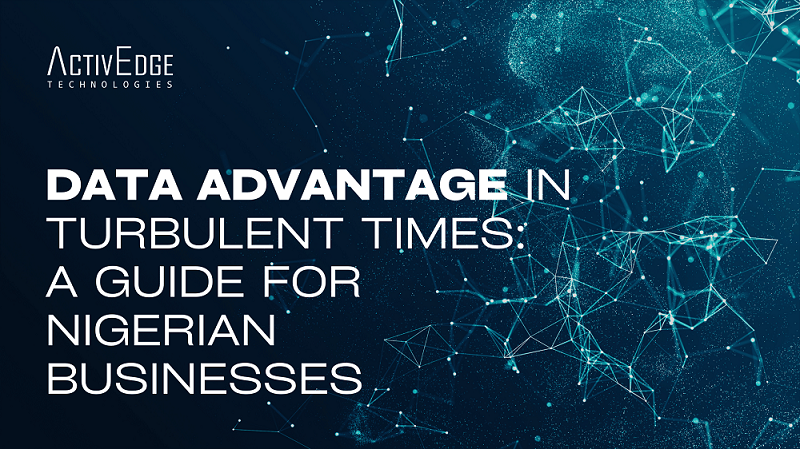Data Advantage in Turbulent Times: A Guide for Nigerian Businesses
The Economic Landscape: A Call for Strategic Action
The last year has been rough for the Nigerian economy. Global instability, a sharp depreciation of the Naira and tightening economic measures pose challenges for businesses across the country. The natural instinct might be to cut costs and wait for the storm to pass.
But what if the most strategic move is to invest?
Turning the Tide with Data-Driven Insights
The herd mentality of cost-cutting can be detrimental. Studies by McKinsey reveal a compelling truth: companies that invest during downturns experience a 10% profit increase, while their peers see a 15% decline. The key lies in leveraging real-time, high-quality data to gain a deeper understanding of your business.
Nigerian consumers are facing reduced spending power and evolving risk profiles. To navigate these changes, your business needs to be sharper than ever. Here’s how data quality can shift perceptions:
Understanding Your Evolving Customer Base
Economic pressures are impacting Nigerian consumers’ spending habits and risk tolerance. Businesses relying on intuition will struggle.
High-quality data empowers you to:
- Enhance Customer Experience: Accurate and complete customer profiles enable you to understand their needs better and deliver experiences that keep customers loyal.
- Personalized Marketing: Targeted offers that deliver genuine value will retain existing customers and attract new ones from less data-driven competitors.
- Accurate Credit Risk Assessment: High-quality data feeds credit and regulatory risk models, allowing for more accurate predictions of customer behavior and potential risks. An example: South Africa’s African Bank’s reliance on mine workers (who faced job losses due to industry disruptions) contributed to their bankruptcy. In contrast, Capitec, a competitor with a different risk management approach, saw increased profits under the same conditions.
Quality Data: Your Path to Efficiency and Growth
Poor data quality can lead to significant losses, while good data translates to cost savings and a competitive edge. Here’s how:
- Predicting Downturn Severity: Quality data empowers business leaders to anticipate the severity of economic downturns and strategically plan staffing needs. While cost-saving retrenchment may seem tempting, it could backfire. Following the COVID-19 pandemic, global businesses that laid off staff faced a scramble to rehire or onboard new talent when the predicted recession was short-lived.
- Reduced Costs: Eliminate the hidden costs associated with bad data (Gartner estimates an average annual cost of $12.9 million!). By automating tasks with reliable data, you free up your team for more strategic activities, leading to a direct and sustainable boost in profits.
- Increased Efficiency: Streamline tasks with reliable data, allowing your team to focus on higher-value activities. For example, one client achieved an 80% reduction in client onboarding time by improving data validation at the point of capture. This resulted in cost savings and improved customer experience through faster service.
Turning Challenges into Opportunities
Economic downturns can present an unexpected advantage for data quality initiatives. With capital projects on hold, IT and business teams have more breathing room to address data issues. The goal of a data quality assurance program is to prevent these issues from recurring.
Here’s your action plan:
- Identify and Address Data Quality Problems: Data quality assessments quantify existing issues and uncover hidden problems hindering your profits. This allows you to prioritize data quality initiatives for maximum business impact.
- Implement Data Quality Checks: These may include dashboards and exception reports for manual data cleansing, as well as data validation and enrichment processes to prevent bad data from entering your systems.
- Utilize Data Cleansing Tools and Techniques: Automation can offer sustainable data quality solutions at scale, minimizing rework and ensuring ongoing benefits.
- Train Your Staff on Data Hygiene Best Practices: Data quality training can instil a culture of prioritizing data quality over quantity. This reduces rework and costly errors that affect downstream operations and decision-making.
- Remember: High-quality data doesn’t equate to perfection. Studies by Dr Thomas Redman et al show that only 3% of data meets basic quality standards. Most companies can make significant and rapid improvements to their critical data.
Invest in Your Future, Today: Proactive Risk Management
Investing in data quality grants valuable insights that empower you to:
- Make informed decisions.
- Strengthen customer relationships.
- Boost efficiency.
- Reduce costs.
- Manage risks proactively.
- Drive growth.
High-quality data is your secret weapon for success, even in challenging times. Don’t wait for the storm to pass. Start investing in your data quality today and navigate these economic uncertainties with confidence.
For more information, visit https://activedgetechnologies.com/
or contact [ [email protected]] to schedule a demo with our experts
Gary Allemann
MD at Master Data Management – 15 years delivery of Data Governance, Data Quality and MDM solutions

